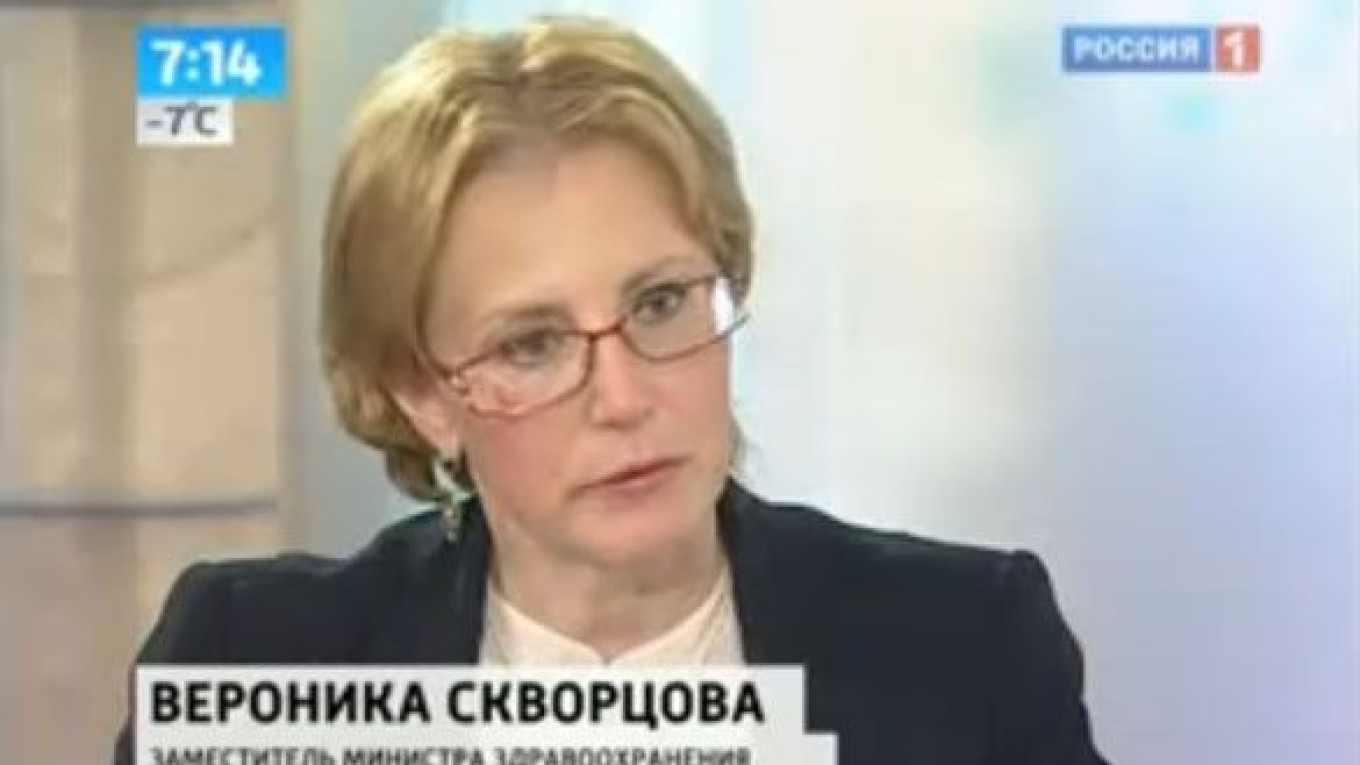ST. PETERSBURG — Foreign and local drugmakers on Tuesday welcomed the appointment of Veronika Skvortsova as health minister, saying they expect her to enforce initiatives promoted by her predecessor, Tatyana Golikova, but bring a scientific approach to resolving industry problems.
Skvortsova will be the key person in charge of implementing the recent order by President Vladimir Putin to improve the health-care system over the next six years, and executives of global pharmaceutical companies said they are ready to provide support in bringing those plans to fruition.
“The tasks set for the ministry are very ambitious, and we … are ready to cooperate to solve these issues,” said Naira Adamyan, the Russian head of Janssen-Cilag, a subsidiary of Johnson & Johnson.
“We understand that the government will face challenges over the next six years, because it is one thing to create a strategy and another thing to implement it,” she told a news conference.
Among the goals set by Putin for his six-year term in the Kremlin is to increase the average life expectancy, which currently stands at 69 years, by improving health-care policy.
To make this happen, the government must — among other things — reduce the mortality rate, develop the scientific foundation of health care and cut the deficit of medical personnel across the country, according to the decree published on the Kremlin website.
Putin also ordered to increase the share of domestically made strategic drugs the government purchases for entitled patients. These tasks complement the goals outlined in the government’s Pharma 2020 strategy, which was passed in 2008 and is aimed at increasing competitiveness of local drug manufacturers by raising the share of locally produced medicines from slightly above 20 percent to 50 percent by 2020.
Skvortsova is the right person to orchestrate the country’s health care because “she’s a good organizer and as a physician she’ll be better received by the medical community than Golikova,” Vasily Ignatyev, chief executive of local drug manufacturer R-Pharm, said in an interview on the sidelines of an industry forum organized by Adam Smith Conferences.
Last year, Golikova — who on Tuesday was appointed by Putin to be his aide — was harshly criticized by pediatrician Leonid Roshal, who said “it’s unfortunate that the Health and Social Development Ministry lacks a normal, experienced organizer.”
Marina Veldanova, head of drug producer Ipsen in Russia, said at the news conference that she is “excited” about Skvortsova’s appointment, because she’s a well-known scientist who gained solid experience while working at the ministry.
“The synergy of these competences is a guarantee that [her ministry’s] policy will be successive on the one hand, ... but that there won’t be changes that will bury our previous expectations,” Veldanova said, adding that Skvortsova might have a scientific approach, which would be welcomed by industry players.
Before being named health minister, Skvortsova, an academician with the Russian Academy of Sciences, was Golikova’s deputy. She is the first professional physician to chair the ministry in at least the past eight years.
Skvortsova will have to deal with drugmakers’ concerns over the prospects of the country’s market, as some of them said Tuesday that they would like to see Russia become a more predictable environment to invest in. Unlike China and India, which provide long-term investment opportunities, Russia is the emerging market of “short-term opportunities,” Adamyan of Janssen-Cilag said.
“Russia is a fully unpredictable environment, which makes … investors nervous,” she said, adding that the market also lacks transparency. “If we can manage these two things the right way, we may become one of the best places to invest.”
A Message from The Moscow Times:
Dear readers,
We are facing unprecedented challenges. Russia's Prosecutor General's Office has designated The Moscow Times as an "undesirable" organization, criminalizing our work and putting our staff at risk of prosecution. This follows our earlier unjust labeling as a "foreign agent."
These actions are direct attempts to silence independent journalism in Russia. The authorities claim our work "discredits the decisions of the Russian leadership." We see things differently: we strive to provide accurate, unbiased reporting on Russia.
We, the journalists of The Moscow Times, refuse to be silenced. But to continue our work, we need your help.
Your support, no matter how small, makes a world of difference. If you can, please support us monthly starting from just $2. It's quick to set up, and every contribution makes a significant impact.
By supporting The Moscow Times, you're defending open, independent journalism in the face of repression. Thank you for standing with us.
Remind me later.


